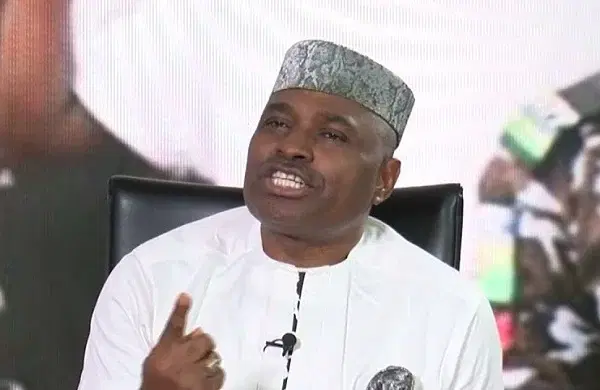2027: Only a United Opposition Can Defeat APC – Okonkwo…As Nigeria looks ahead to the 2027 presidential elections, political figures are increasingly warning that the only way to challenge the dominance of the All Progressives Congress (APC) is through a unified opposition.
One of the most vocal advocates for this approach is Kenneth Okonkwo, a former chieftain of the Labour Party (LP), who believes that without a solid coalition among opposition parties, the APC will retain its grip on power.
Okonkwo, who made headlines in February 2025 when he resigned from the LP, has been a prominent voice in Nigerian politics. In a recent interview on Channels Television’s Sunday Politics, Okonkwo made it clear that a single candidate cannot defeat President Bola Tinubu’s APC in the 2027 elections. “No one candidate, no matter their pedigree or popularity, can defeat Tinubu and the APC on their own,” he asserted. His argument was simple: the political landscape in Nigeria has changed, and to successfully challenge the ruling party, the opposition must come together, as was done in 2014 when various factions united to form the APC and ended the 16-year rule of the People’s Democratic Party (PDP).
The former actor-turned-politician’s comments highlight a broader issue within Nigeria’s political opposition. The country’s main opposition parties, particularly the PDP and the Labour Party, have been plagued by internal divisions, which Okonkwo warns will only benefit the APC. According to him, without a collective effort from opposition leaders, the APC will continue to control the political narrative and retain its stronghold on power, despite the challenges that may arise during the campaign season. “Unity is crucial. If opposition leaders cannot see the importance of working together, the APC will have a clear path to victory in 2027,” Okonkwo said, stressing the importance of collaboration among parties to mount a credible challenge.
The need for opposition unity has become even more apparent in recent months, as defections from the opposition to the APC have continued to erode the opposition’s strength. In particular, recent high-profile defections, including that of Delta State Governor Sheriff Oborevwori from the PDP to the APC, have raised concerns about the integrity of opposition efforts. Okonkwo has been highly critical of such moves, warning that these defections are likely driven by opportunism and a desire to manipulate electoral processes in favor of the ruling party. For Okonkwo, these defections serve as a reminder of how fragmented the opposition is and the urgent need for a unified front to defeat the APC.
READ MORE: China Slaps Anti-Dumping Duties on Plastic Imports from US, EU, Japan
However, Okonkwo also sees hope in the potential for unity among opposition forces. He has been vocal in calling for a broad-based coalition that transcends the traditional party lines. Okonkwo believes that such a coalition could draw from the ranks of not just the PDP and Labour Party, but also smaller parties and political movements that share a common goal of challenging the APC. According to him, the success of the 2015 APC campaign was built on the back of such a coalition, which brought together various groups with differing ideologies under a common cause. “In 2015, it was not one party that beat the PDP. It was a coalition of different groups,” he pointed out. “In the same way, only a unified opposition can defeat the APC in 2027.”
Alongside his calls for a united opposition, Okonkwo has suggested that a single-term presidency could serve as an essential factor in bridging the gap between different regions. With the issue of zoning and power rotation being a contentious matter in Nigerian politics, Okonkwo proposed that the opposition parties agree to a single-term pact. This agreement would involve a candidate committing to serve just one term, regardless of whether they are from the northern or southern part of the country. According to Okonkwo, this approach could address the concerns about power-sharing between the North and South, which has been a source of tension in Nigerian politics for decades.
The push for a united opposition comes at a time when Nigeria is facing significant challenges in governance, economic instability, and national security. Okonkwo’s statement is not just a critique of the APC’s policies but a call to action for the opposition to set aside their differences and focus on the common goal of winning the 2027 election. He believes that failure to unite would not only mean the continued dominance of the APC but also the persistence of the problems that many Nigerians are dissatisfied with.
In the lead-up to the 2027 elections, political analysts have noted that Okonkwo’s calls for unity are reflective of broader concerns within the opposition. The APC’s ability to maintain a united front and manage defections within its ranks will be tested, but so too will the opposition’s ability to build a cohesive and effective alliance. As the 2027 election draws closer, it remains to be seen whether Okonkwo’s vision for a united opposition will become a reality or whether internal divisions will once again play a role in the APC’s continued dominance.




